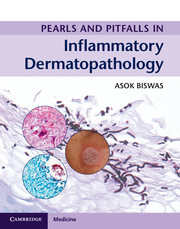Book contents
- Pearls and Pitfalls in Inflammatory Dermatopathology
- Pearls and Pitfalls in Inflammatory Dermatopathology
- Copyright page
- Dedication
- Contents
- Preface
- Acknowledgments
- Foreword
- Chapter 1 Introduction
- Chapter 2 Spongiotic Dermatitis
- Chapter 3 Psoriasiform Dermatitis
- Chapter 4 Interface Dermatitis
- Chapter 5 Intraepidermal Vesiculobullous Dermatitis
- Chapter 6 Subepidermal Vesiculobullous Dermatitis
- Chapter 7 Perivascular Dermatitis with No/Minimal Epidermal Changes
- Chapter 8 Nodular and Diffuse Dermatitis
- Chapter 9 Folliculitis/Perifolliculitis
- Chapter 10 Fibrosing Dermatitis
- Chapter 11 Vasculitis
- Chapter 12 Panniculitis
- Index
- References
Chapter 10 - Fibrosing Dermatitis
Published online by Cambridge University Press: 24 March 2017
- Pearls and Pitfalls in Inflammatory Dermatopathology
- Pearls and Pitfalls in Inflammatory Dermatopathology
- Copyright page
- Dedication
- Contents
- Preface
- Acknowledgments
- Foreword
- Chapter 1 Introduction
- Chapter 2 Spongiotic Dermatitis
- Chapter 3 Psoriasiform Dermatitis
- Chapter 4 Interface Dermatitis
- Chapter 5 Intraepidermal Vesiculobullous Dermatitis
- Chapter 6 Subepidermal Vesiculobullous Dermatitis
- Chapter 7 Perivascular Dermatitis with No/Minimal Epidermal Changes
- Chapter 8 Nodular and Diffuse Dermatitis
- Chapter 9 Folliculitis/Perifolliculitis
- Chapter 10 Fibrosing Dermatitis
- Chapter 11 Vasculitis
- Chapter 12 Panniculitis
- Index
- References
- Type
- Chapter
- Information
- Pearls and Pitfalls in Inflammatory Dermatopathology , pp. 239 - 266Publisher: Cambridge University PressPrint publication year: 2016

